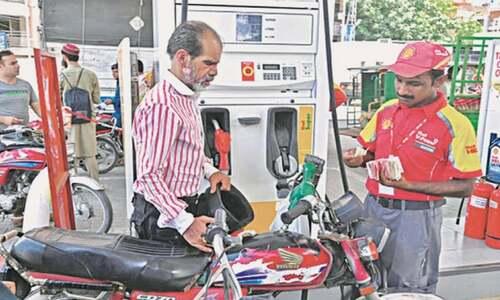KARACHI: “I’m so happy that I’ve got my nose back! Now I can show it to my relatives and all the village women who had laughed at me and said that doctors were lying to me and I could never have a nose again,” says Lali Bai, a domestic violence victim being treated in a Jinnah Postgraduate Medical Centre ward.
Lali has undergone multiple surgeries over more than two months for her nose reconstruction and is set to leave the JMPC in a few days.
“I’m greatly satisfied with the job done by the doctors as this small nose looks more appropriate on my face than my natural nose, though I’m having a little difficulty in breathing,” she says with a smile in her native Sindhi language.
A member of the Bheel community and resident of a small village in Sanghar, Lali was accused of having relations with someone by her husband eight months ago. He took her to a deserted area and cut off her nose, ears and part of her chest apparently in a fit of rage. After inflicting serious injuries upon her, he went back home, strangled their 15-day-old boy and fled. Later he was arrested and put behind bars.
In the meantime, Lali regained her strength and sought help from people but it took her elder brother-in-law at least seven to eight hours to shift her to the district tertiary care hospital where she received initial treatment.
“Memories of those days still haunt me. My children, two-year-old Puja and three-year-old Mukesh, are with my in-laws’ and I haven’t seen them since that incident,” she says, adding that the children’s custody and her divorce issue would be settled by family elders through a punchayet (a village council) comprising community representatives once she returns to her village.
Lali’s family had received Rs100,000 compensation from the government and some financial assistance by people in Sanghar, which she says was not enough. “The family couldn’t work for many months because of the ordeal we had been through. Though the treatment and stay is free at the JPMC, we are incurring some expenses,” says Achhar, her younger brother.
The family earns income by whatever employment opportunity they get back home. Lali, who used to work in the fields, is now looking forward to resuming her work. “None of us in the community is educated. So, I don’t have any option but to return to the fields to earn a living,” she says.
Lali was not immediately treated for her wounds as the long time taken in bringing her to the hospital made the chances for any kind of immediate surgery impossible, said Dr Nasir Zaman Khan, professor and head of the department of plastic surgery in the JPMC.
“The wounds were deep and operating on her at that time would have been disastrous as there were severe inflammation all over her body parts. So, we had to wait till all her wounds healed,” he says, stressing that such patients should be brought to hospital within 24 hours.
Three surgeries were performed on the victim at the JPMC, all free, which, according to Dr Zaman, would have cost Rs900,000 in a private health setting.
“There was a slight delay as we were unable to find a donor but later I found the tissue expander required for the surgery from the hospital,” he said, adding that her breathing problem was because of her small nostrils which would be fixed at a later stage.
“A little damage had been caused to her breast and what had been done couldn’t be rectified through surgery. It might heal with the passage of time,” he said.
A report compiled by the Aurat Foundation says that 4,585 cases of violence against women have been reported from January to June this year across the country. Of them, 69 per cent have been reported in Punjab and 22pc (1,027 cases) in Sindh.
Murder, which constitutes 15pc of the total cases of violence against women, is found to be the most prevalent crime against women in Sindh. A total of 436 honour killing cases have been reported across the country.












































